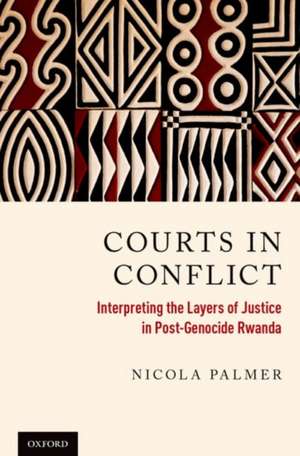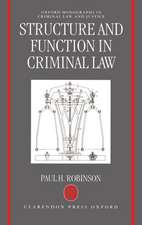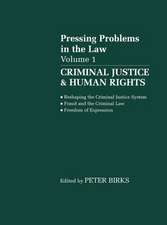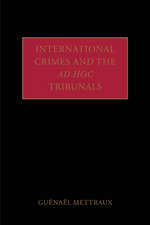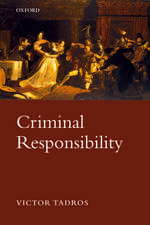Courts in Conflict: Interpreting the Layers of Justice in Post-Genocide Rwanda
Autor Nicola Palmeren Limba Engleză Paperback – 4 iul 2019
| Toate formatele și edițiile | Preț | Express |
|---|---|---|
| Paperback (1) | 259.20 lei 32-37 zile | |
| Oxford University Press – 4 iul 2019 | 259.20 lei 32-37 zile | |
| Hardback (1) | 626.51 lei 32-37 zile | |
| Oxford University Press – 7 mai 2015 | 626.51 lei 32-37 zile |
Preț: 259.20 lei
Preț vechi: 322.79 lei
-20% Nou
Puncte Express: 389
Preț estimativ în valută:
49.60€ • 51.93$ • 41.14£
49.60€ • 51.93$ • 41.14£
Carte tipărită la comandă
Livrare economică 31 martie-05 aprilie
Preluare comenzi: 021 569.72.76
Specificații
ISBN-13: 9780190941895
ISBN-10: 0190941898
Pagini: 240
Dimensiuni: 234 x 156 x 14 mm
Greutate: 0.37 kg
Editura: Oxford University Press
Colecția OUP USA
Locul publicării:New York, United States
ISBN-10: 0190941898
Pagini: 240
Dimensiuni: 234 x 156 x 14 mm
Greutate: 0.37 kg
Editura: Oxford University Press
Colecția OUP USA
Locul publicării:New York, United States
Recenzii
Nicola Palmer's Courts in Conflict bursts with intellect, verve, and insight. Palmer dignifies, illuminates, and educates. She demonstrates how different courts adjudicating genocide deliberately see themselves as fulfilling different and distinct ambitions. Palmer wisely approaches tensions among institutions not as technical or bureaucratic, but rather as cultural and ideational. This book serves the broader didactic purpose of instructing on how post-conflict justice, wherever and whenever, can become meaningful."- Mark A. Drumbl, Class of 1975 Alumni Professor of Law, Washington and Lee University & Director, Transnational Law Institute
This book on the versions of transitional justice developed in the Rwandan genocide context well illustrates manifest tensions concerning political power, legitimacy, and the intersection between law and lawyers at the international, national, and local level. Dr. Palmer navigates this complex terrain with great clarity and rigor. The book is an excellent addition to the growing literature on the Rwandan case-study but also has much to offer to larger debates within transitional justice in general. An important book."- Kieran McEvoy, Professor of Law and Transitional Justice, Queens University Belfast
Courts in Conflict: Interpreting the Layers of Justice in Post-Genocide Rwanda is an incisive and important work. Based on original empirical research, Palmer offers new insights into the justice processes that followed the 1994 Rwandan genocide and a groundbreaking analysis of the interaction of national and international criminal tribunals more broadly. Courts in Conflict is a significant contribution to the field; it warrants close reading by scholars, practitioners, and policy makers alike."- Madeline Morris, Professor of Law, Duke Law School
For the authoritative comparative study into all aspects of the transnational judicial reckoning with Rwanda's genocide and a fresh interpretation of the role courts can play in reestablishing institutional legitimacy after political transition
Palmer devotes a chapter to each court system. Her effective use of "thick description" reflects exemplary research, based on scores of interviews; meticulous examination of court records, statutes, and cases; and reference to an impressive array of relevant scholarship. Courts in Conflict thus ranks as a valuable addition to several areas: transitional justice; theory and practice of multilevel judicial systems; post-1994 Rwanda; and the questionable assumption that local, national, and international jurisdictions complement each other. Palmer's case study calls out for similar work as global justice efforts increase. Highly recommended." - C. E. Welch, University at Buffalo, SUNY, Choice
Palmer's study presents a valuable diagnosis for multiple transitional justice initiatives that fail to aggregate their aims and reveals how some of the boundaries of transitional justice are sketched from the inside the courts themselves. This makes the book a must read both for practitioners engaged in international or transnational justice and cooperation, as well as for students who are interested in making more sense of transitional justice initiatives in post-conflict situations. Equally, it provides crucial guidance for further empirical studies." - Gabriela-Mihaela Ivan-Cucu, Univ. of Nottingham, Journal of Conflict & Security Law
This book on the versions of transitional justice developed in the Rwandan genocide context well illustrates manifest tensions concerning political power, legitimacy, and the intersection between law and lawyers at the international, national, and local level. Dr. Palmer navigates this complex terrain with great clarity and rigor. The book is an excellent addition to the growing literature on the Rwandan case-study but also has much to offer to larger debates within transitional justice in general. An important book."- Kieran McEvoy, Professor of Law and Transitional Justice, Queens University Belfast
Courts in Conflict: Interpreting the Layers of Justice in Post-Genocide Rwanda is an incisive and important work. Based on original empirical research, Palmer offers new insights into the justice processes that followed the 1994 Rwandan genocide and a groundbreaking analysis of the interaction of national and international criminal tribunals more broadly. Courts in Conflict is a significant contribution to the field; it warrants close reading by scholars, practitioners, and policy makers alike."- Madeline Morris, Professor of Law, Duke Law School
For the authoritative comparative study into all aspects of the transnational judicial reckoning with Rwanda's genocide and a fresh interpretation of the role courts can play in reestablishing institutional legitimacy after political transition
Palmer devotes a chapter to each court system. Her effective use of "thick description" reflects exemplary research, based on scores of interviews; meticulous examination of court records, statutes, and cases; and reference to an impressive array of relevant scholarship. Courts in Conflict thus ranks as a valuable addition to several areas: transitional justice; theory and practice of multilevel judicial systems; post-1994 Rwanda; and the questionable assumption that local, national, and international jurisdictions complement each other. Palmer's case study calls out for similar work as global justice efforts increase. Highly recommended." - C. E. Welch, University at Buffalo, SUNY, Choice
Palmer's study presents a valuable diagnosis for multiple transitional justice initiatives that fail to aggregate their aims and reveals how some of the boundaries of transitional justice are sketched from the inside the courts themselves. This makes the book a must read both for practitioners engaged in international or transnational justice and cooperation, as well as for students who are interested in making more sense of transitional justice initiatives in post-conflict situations. Equally, it provides crucial guidance for further empirical studies." - Gabriela-Mihaela Ivan-Cucu, Univ. of Nottingham, Journal of Conflict & Security Law
Notă biografică
Nicola Palmer is a lecturer in criminal law at the Dickson Poon School of Law, King's College London, and a research associate at the Centre for Criminology, University of Oxford. In addition, she serves as an advisory board member of Oxford Transitional Justice Research. Dr. Palmer received her D.Phil in law from the University of Oxford in 2011, where she studied as a Rhodes scholar. Prior to starting her doctoral studies, she worked as a legal assistant at the United Nations International Criminal Tribunal for Rwanda (ICTR), having completed her undergraduate and honours degrees in law and economics at Rhodes University, South Africa. Her broad research interests are in international criminal law, transitional justice, central African studies, and legal anthropology.
